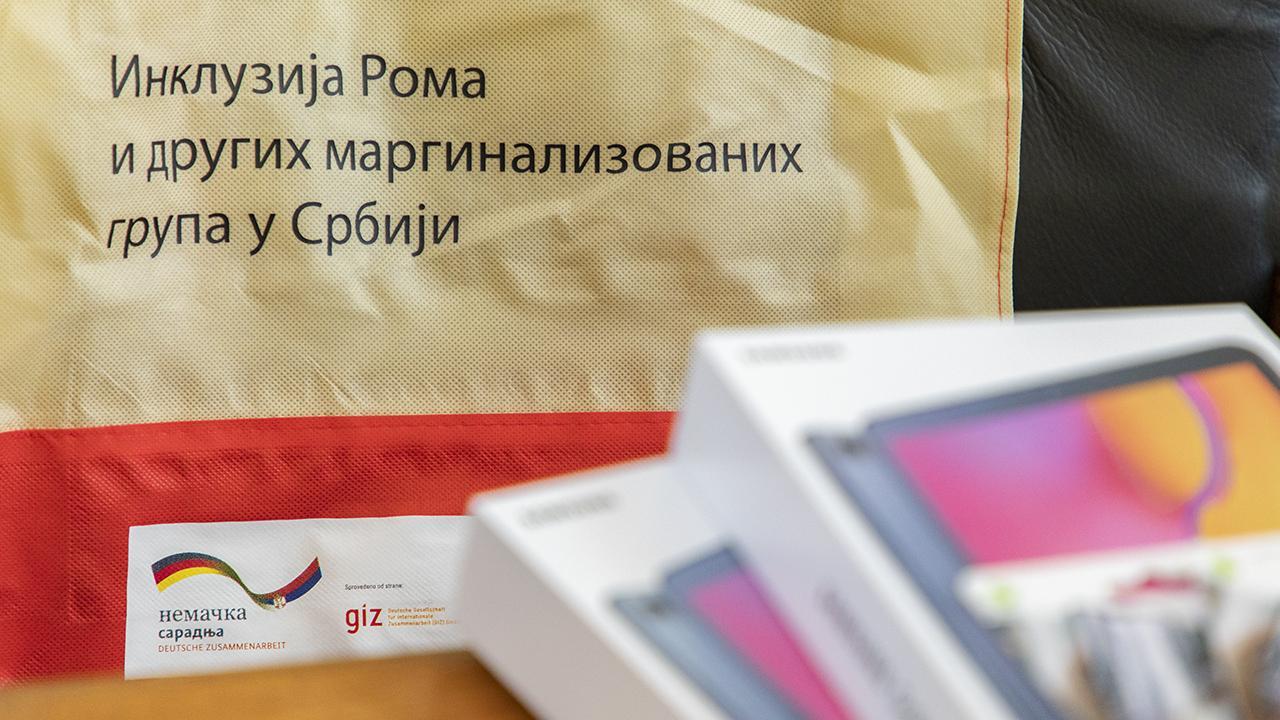To meet the need of training secondary school students to combat discrimination against Roma, the Deutsche Gesellschaft für Internationale Zusammenarbeit (GIZ) GmbH in cooperation with the Ternipe Association from Pirot distributed 20 tablets, donated by the German Federal Ministry for Economic Cooperation and Development (BMZ), to secondary schools in Serbia, whose students will participate in these trainings. The trainings are organized within the campaign „Meet, do not judge“ with the aim to eliminate stereotypes and discrimination according to the “Handbook for Secondary School Students to Combat Stereotypes about Roma and to Educate on Mechanisms to Combat Discrimination”, developed in cooperation with the Serbian Ministry of Education, Science and Technological Development.
Due to the crisis caused by the COVID-19 virus, the training courses for the students, which are organized by the Ternipe association and GIZ, will be virtual. The trainings will start on September 21 and last 10 days. Once the online training has been carried out, the schools will be able to use the equipment for daily teaching activities.
„In addition to reducing stereotypes and prejudices against Roma among secondary school students, these measures, which are part of the ‘Inform yourself and don’t judge’ campaign, will also enable students to learn more about the Roma population and discrimination itself. They can then share their new knowledge with their peers through active participation in school parliaments and other school activities“, emphasized the project manager in the German Development Cooperation project „Inclusion of Roma and other marginalized groups in Serbia“, implemented by GIZ, Petar Antić.
He added that such activities at schools are of particular importance, especially in view of the fact that school is one of the most important factors that can influence the attitudes of young people towards minorities, which was also confirmed by the survey „How citizens in Serbia perceive discrimination“, which was supported by GIZ within the framework of German development cooperation. The respondents see the media (84%), the families (78%), the schools, the government and citizens themselves (76% each) as institutions that can make the greatest contribution to reducing discrimination.
The schools will lend this equipment, two tablets and headphones, to each student participating in the webinar and these will be used to track online activities during the training sessions, as well as for virtual meetings with representatives of national anti-discrimination authorities and civil society organizations. It has also been planned that the students will use the tablets immediately after the training to actively participate in the campaign and raise awareness against discrimination of minorities on the Internet.
„The school will leave the tablets with the students participating in the training activities so that they can use them for educational purposes, for surveys among other students on the subject, and for the preparation of materials for panel discussions and workshops. They will be able to share with their peers their knowledge of anti-discrimination issues that they will acquire in training courses at the lectures and meetings of the students’ parliament, ethics classes and workshops. In addition, students will also be able to use this equipment to upload materials to Google Classroom and to host the Youth Forum“, explained Siniša Kojić, principal of the vocational school Kragujevac. He emphasized that the total number of pupils of Roma origin at this school is 105, and that the school is strongly committed to working with disadvantaged groups through the implementation of similar projects. „One of the most important indicators that confirms that we are addressing this issue is also the increased number of Roma children enrolled in our school“, Siniša Kojić added.
The equipment will be donated to secondary schools throughout Serbia: Commercial School in Vranje, Technical School in Zrenjanin, School of Watercraft, Shipbuilding and Hydraulic Engineering in Belgrade, Grammar School Svetozar Marković in Niš, Vocational School in Kragujevac, Vocational School of Mechanical Engineering in Novi Sad, Dairy School Dr. Obren Pejić in Pirot, Commercial School in Požarevac, Grammar School in Kruševac and Medical School in Zaječar.


